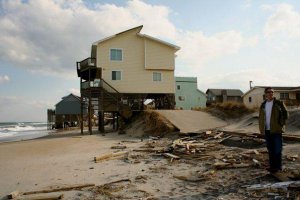Presented By: Center for Sustainable Systems
Sustainable Systems FORUM # 5
Natural Resource Economics and Coastal Erosion Management

Come join us for our Sustainable Systems Forum series. The SS Forum is intended to explore topics of interest to those involved in the Sustainable Systems field of study, but all are welcome to attend these events. Speakers will present on topics in sustainability with opportunities for the audience to engage in the discussion.
SPEAKER: Craig Landry, Associate Professor of Economics, East Carolina University
His interests include environmental and natural resource economics, non-market valuation, and coastal resource management.
ABSTRACT: Natural Resource Economics provides tools for optimizing coupled economic and natural systems. Dr. Landry reviews applications of dynamic optimization models applied to coastal erosion, focusing attention on estimates of benefits and costs of beach maintenance as inputs into these models. He reviews the existing literature that attempts to measure the value of beach width as capitalized in the value of residential coastal housing. Using data from Dare County, North Carolina (the ”˜Outer Banks’) he explores specification issues in hedonic coastal property models, including:
i) accounting for proximity to the shore in capturing the value of beaches as a local public good;
ii) definition of ”˜extent of the market’;
iii) potential errors-in-variables stemming from the dynamic nature of beaches; and
iv) spatial autocorrelation in hedonic regression models.
In accord with previous research, he finds evidence of errors-in-variables, but the proffered explanations for this specification problem do not apply to the current dataset. He explores whether spatial regression models can address this problem, or whether new formulations that allow for sorting of heterogeneous agents in the coastal property market might be needed.
SPEAKER: Craig Landry, Associate Professor of Economics, East Carolina University
His interests include environmental and natural resource economics, non-market valuation, and coastal resource management.
ABSTRACT: Natural Resource Economics provides tools for optimizing coupled economic and natural systems. Dr. Landry reviews applications of dynamic optimization models applied to coastal erosion, focusing attention on estimates of benefits and costs of beach maintenance as inputs into these models. He reviews the existing literature that attempts to measure the value of beach width as capitalized in the value of residential coastal housing. Using data from Dare County, North Carolina (the ”˜Outer Banks’) he explores specification issues in hedonic coastal property models, including:
i) accounting for proximity to the shore in capturing the value of beaches as a local public good;
ii) definition of ”˜extent of the market’;
iii) potential errors-in-variables stemming from the dynamic nature of beaches; and
iv) spatial autocorrelation in hedonic regression models.
In accord with previous research, he finds evidence of errors-in-variables, but the proffered explanations for this specification problem do not apply to the current dataset. He explores whether spatial regression models can address this problem, or whether new formulations that allow for sorting of heterogeneous agents in the coastal property market might be needed.